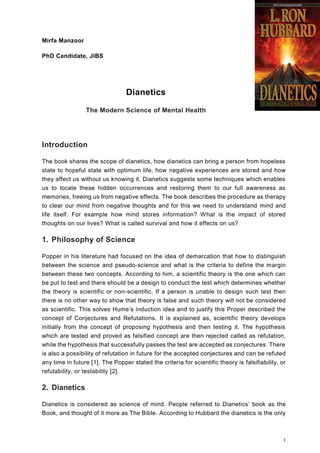4 Easy Facts About Dianetics Explained
4 Easy Facts About Dianetics Explained
Blog Article
The Best Guide To Dianetics
Table of ContentsWhat Does Dianetics Do?The 2-Minute Rule for DianeticsThings about DianeticsAn Unbiased View of Dianetics
I could not ever not wish to get anything that enters your mind for you- if it was otherwise, I would not be resting below with you, doing this. I not only can never ever have a trouble, or not wish to listen to something that comes to mind for you, but I'm entirely eager to understand every idea, every thought, every picture or sensation that emerges or manifests for you- don't ever think or else, and if somehow you do, please just let me understand! Sometimes, you may have an idea, and photo, concept or incident appear that does not seem to answer the concern, or associate with it, yet however, always do inform me about it, and as we continue, the significance will arise for you.This is intrinsic in the basis of handling, and the subject of this discussion: the standard functions of the therapist and the customer: The basic function of the therapist is, contrary to "typical training", not to regulate, which suggests to implement and/or prevent, but to instead work from the basis of EMPOWERING THE CUSTOMER.

9 Simple Techniques For Dianetics
John Mcmasters expressed this basic truth wonderfully well in among his lectures on Power processing, where he explains how he was asked what this "unique flair" was that he had for offering such wonderful sessions; he needed to consider that for a minute, and spotted that it was what he had not been doing, as well as what he was doing: he wasn't reviewing, judging, computer, or as a matter of fact, producing any type of ideas, allow alone verbal expressions, after giving the command and while waiting for the computer to finish their response to their fulfillment; he was, just and only, being present with the PC, and entirely interested.
The duty of the counselor, demonstrated; that was his "special knack". I have actually had my very own experience which instructed me this well, really early in the game. In 1982, having recently completed my training and teaching fellowship on New Age Dianetics, I was running this on a PC, and there was a point in the session where (being a bit damp behind the ears not yet having numerous hours under my belt as a professional auditor) the computer appeared to be "taking too lengthy" to express anything vocally after I gave him a command.
This trick ended up being one of the most important contribution that John ever before made to the subject of treatment or bookkeeping (Dianetics). In my modest viewpoint, it is the best payment that anybody has actually ever made to these subjectsthe application is totally non-judgemental, non-evaluative, and empty of any kind of idea, advice or opinion.no preconceived agenda for individuals, or 'degrees' that they have to do
In Idenics, the only resource of details regarding a client is the individual customer. In Scientology we prided ourselves on not evaluating for people. All that actually meant was that the auditor did not Vocally assess for the PC in session. The registrars and values officers examined for the PC.
Our Dianetics Statements

Any person who had actually ever before seen John audit could not aid but notice an unique high quality in his bookkeeping."The client's standard duty is to be there with the objective of relocating the instructions of their spiritual goals, and to easily and completely share and experience whatever shows up for them in answering the questions find out here now and performing the directions in the processing.
This is something to process as needed. However additionally, individuals frequently have previous experience and/or indoctrination in auditing/processing which, in some ways, and to some extent, really misleads them right into perspectives, concepts and habits patterns that stop the complete realization of these functions, therefore they will have a tendency to prevent the expressing of what enters your mind, as in the examples given above. * The initial, Homepage and possibly primary instances of mis-indoctrination leading to less than totally smooth and efficient sessions, can be located in particular elements of the training routines, or "TR's":"TR's" are typically a person's first, or a minimum of early, experience in Scientology, and while I will take place to clarify what I see as the problems in concept and technique, however, often tend to be greatly restorative, done as they are given (Hubbard urges that "TR's are not refining, they are training", however factually, they are both processing AND training)
There is no "failing", and no rejection of the reality of this being processing. The emphasis, as it must be, is on experiencing the various other person's visibility.
The Greatest Guide To Dianetics

Report this page